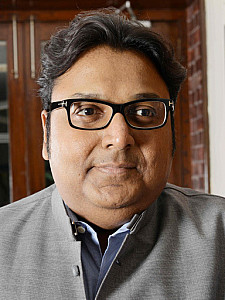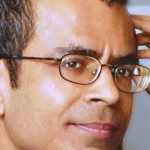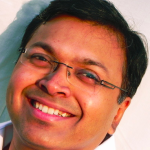ZEEJLF Conversations: Ashwin Sanghi
Verve speaks to thriller fiction writer, Ashwin Sanghi
On books and his writing style
“I did a lot of reading when I was a kid. My grandfather sent me a book every week. That started from when I was 12 years old till the time I was 24, so in his lifetime he passed on to me about 300-400 books. It was a wide variety of reading, ranging from Tolstoy to Dickens to more spiritual stuff like The Autobiography of a Yogi, the Mahabharata; it is a wide spectrum. My sensibilities have been shaped by that. On the other hand, I grew up reading thrillers. So the style is much more fast-paced but the content is much more spiritual and mythological.”
On being labeled the ‘Dan Brown of India’
“Dan Brown of India? Honestly, I’m flattered! I’m one of those people who has always loved Dan Brown. There’s a desire that if labels have to happen, I’m hoping there will be a day when someone might say, ‘Oh, this is an American Ashwin Sanghi or the English Ashwin Sanghi’, if that happens, then that will be the day that I have arrived.”
On defying labels
“That’s what I’ve been trying to get out of. The Rozabal Line is hardly mythological; it is theological. Chanakya’s Chant had no mythology in it; it’s more historical. The Krishna Key was the only one with mythology in it. But then I completely broke away from it and went to Private India with Patterson, which was an out and out crime thriller. And now with this latest book, 13 Steps to Bloody Good Luck, I’ve gone into non-fiction. I don’t want to be predictable.”
On working with James Patterson
“James is a great guy to work with because he has made collaborations into an art form. Writing is an intensely personal activity. Patterson made it very easy. He normally writes an outline, much like kids indulge in colouring. The outlines are there and then you fill in the colour as long as you are operating within the lines. Patterson usually does the outlines and then gives it to you for colouring. But in my case, he asked me to draw the picture. He had some changes to make in that. Once the picture was finalised and we were both okay with it, he asked me to write the first draft, which I sent in four bits. He would write the second and third drafts which worked beautifully. One of the series James has created is the Private Series which is a global detective series and he wanted to do one on India. Our publishers got us together. It was like one of those matchmaking traditions where the families get together, and the parties concerned are informed much later!”
On movie and television adaptations of his books
“When Chanakya’s Chant had just come out, I had sold the option for a year. The production house came back to me to extend the option for the second year which I was quite okay with because they were paying me a second time. They were having some problems because they had engaged two different scriptwriters to write the script and neither of the scripts worked out the way they wanted and they came back to me the third time, by which time I was quite fed up with this whole process and thought I’d go with someone else. I sold the option a third and fourth time, and now I feel like I’m making more money selling the option again and again! With The Krishna Key, I’m not selling the movie rights because I’m very clear in my mind that eventually when it will be converted for any visual format, it will be for a television series, not a movie.”
On writing thriller fiction
“The way I like to think about it, writing is an art but writing a thriller is a craft. Craft is one of those where you write better and better; you grow as a craftsman.”
On the ZeeJLF
“Jaipur has now gone beyond simply being ‘another lit fest’. Jaipur has become more a festival of culture. An intellectual, cultural, spiritual festival, a celebration in that sense. And if you look at it, the atmosphere is that of a carnival. In general, today we are in a situation where we have far too may lit fests, and many of them aren’t worth the paper they are written on.”
Related posts from Verve:
Verve Trending
Sorry. No data so far.
us on Facebook to stay updated with the latest trends






